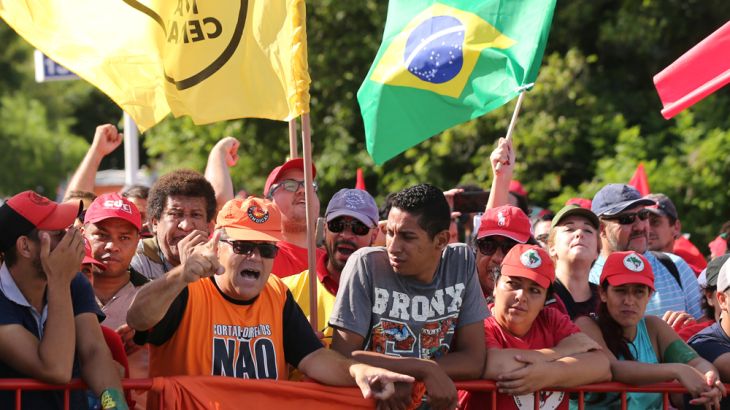Brazil court upholds Lula da Silva’s graft conviction
Popular former president barred from running in October elections that opinion polls suggest he would comfortably win.

Sao Paulo, Brazil – Widely popular former president Luiz Inacio “Lula” da Silva has been banned from running in elections this year after an appeals court upheld corruption-related convictions.
Opinion polls suggest the former leftist leader would win October’s general elections comfortably.
Keep reading
list of 4 itemsA year since Pakistan’s May 9 riots: A timeline of political upheaval
Fiji’s former Prime Minister Frank Bainimarama jailed for a year
Candidates confront corruption and inequality in Panama’s presidential race
He vehemently denied the corruption charges and said he is the victim of a political witch-hunt to stop him from running.
“If I had one percent in the polls, no one would want to stop me from running,” Lula da Silva said last week.
The court’s verdict was delivered on Wednesday in the southern city of Porto Alegre, where thousands of Lula da Silva’s supporters gathered with signs bearing the slogan “Elections without Lula is fraud.”
Elsewhere in Porto Alegre, rival crowds gathered to celebrate the court ruling.
Lula’s political adversaries also cheered.
Far-right former army captain and congressman for Rio de Janeiro Jair Bolsonaro – currently polling second – posed in a thumbs up picture on social media alongside a TV screen of the verdict being delivered.
The court’s decision is expected to further exacerbate social tensions in Brazil, which for the past few years has been rocked by political, economic, and institutional crises.
‘Car Wash’ investigation
Lula’s handpicked successor, Dilma Rousseff, was controversially impeached in 2016 as the economy tanked, accused of manipulating federal budgets, a charge she and Worker’s Party supporters say amounted to a parliamentary coup.
Current President Michel Temer managed to survive two corruption-related trials in congress last year, but only by horse-trading with legislators, critics say.
|
|
His approval rating hovers around five percent.
The court found Lula da Silva guilty of accepting a luxury apartment and refurbishments worth more $1m as a bribe, to help secure lucrative contracts for construction firm OAS with Brazil’s state oil giant Petrobras.
He was sentenced to nearly 10 years in prison for corruption and money-laundering last year, but remained free on appeal.
The charges are part of the corruption investigation dubbed Car Wash that prosecutors liken to a Brazilian Watergate, which has taken down dozens of high-profile politicians and business tycoons.
Lula da Silva’s legal team said no material evidence has been presented to prove the apartment in question was his, and the conviction is merely based on testimony of Leo Pinheiro, OAS president, who received a shorter sentence for plea bargaining.
His lawyers said they will continue to appeal Wednesday’s verdict.
Lula da Silva has said he plans to carry on travelling the country campaigning, regardless of the ruling.
Most analysts doubt the 72-year-old will face jail time.
He may not be entirely out of the electoral race yet, though: Brazil’s complex legal code allows for multiple appeals and some analysts say the case could drag on for six months.
“There are several resources that he can use in order to try and run as a candidate,” said Tony Chalita, a specialist in political and electoral law and partner at Braga Nascimento and Zilio Advogados Associados in Sao Paulo.
Lula da Silva can also register his candidacy and then step aside for a replacement from his party 20 days before the elections, an outcome that Chalita said could be likely.
“He would be able to campaign across the country, gather support, and then change for another recognisable name in his party,” he said.
Members of Lula da Silva’s left-leaning Worker’s Party have so far refused to mention who would be a secondary candidate.
“Our plan is Lula until the end and, therefore, we won’t discuss alternatives,” said Paulo Teixeira, a Worker’s Party federal congressman from Sao Paulo.
Significant support
Brazil’s leading financial daily Valor Economico recently published research that suggested at least 50 percent of Lula da Silva voters would back a Lula-picked candidate.
If Lula da Silva is barred from running, this year’s elections will be the most unpredictable in years, with at least six candidates with a chance to get to the second round runoff.
Bolsonaro is known for homophobic remarks and an extreme view of law and order whose growth in popularity has matched rising violence nationwide.
Markets celebrated the appeal’s court decision with the Sao Paulo stock index gaining heavily on account of presumptions that Lula would attempt to undo austerity measures introduced by Temer if elected.
From 2003-2010, Lula da Silva presided over a period of sustainable growth in Brazil, fed by a commodities boom, in which millions were lifted out of poverty and Brazil rose to the forefront of global economic heavyweights.
He left office with record-high approval ratings.
Analysts say his legacy ensures continued high support, in spite of the conviction and several other corruption-related charges, especially given Brazil’s current economic downturn.
Unemployment remains at a near record-high 12 percent, while living costs such as petrol prices and cooking gas have risen.
A recent slight macroeconomic recovery has yet to be felt by the vast majority of the population.
“People are struggling on a day-to-day basis and they are scared for the future,” said Mauricio Santoro, a political scientist at Rio de Janeiro State University.
“Within this context, the image and memory of Lula are that of a golden age for the Brazilian economy.”